Daily Vocabulary Words: Enhance Your Lexicon with Leading Newspapers & Publications
Welcome to the Daily Vocabulary section at Wordpandit!
Our mission is straightforward: to bring you essential vocabulary words featured in top newspapers and publications worldwide. By focusing on words you’ll encounter in renowned sources, we aim to help you enhance your vocabulary effectively and practically.
Our selection includes words from:
– The New York Times
– The Washington Post
– Scientific American
– BBC
– The Guardian
– Psychology Today
– Wall Street Journal
– The Economist
– The Hindu
– The Times of India
– The Economic Times
– Hindustan Times
– Live Mint
– The Indian Express
– And many more.
We are committed to your vocabulary development. Simply visit this section regularly and explore the daily posts. This is your go-to repository for commonly used words, providing significant practical benefits by familiarizing you with vocabulary from the leading publications listed above.
Make it a habit to visit our website daily and expand your lexicon with words from top newspapers and publications.
WORD-1: Ratcheted
CONTEXT: Both sides have ratcheted up the rhetoric over India’s international ties and in some cases, even the re-opening of settled bilateral agreements.
SOURCE: The Hindu
EXPLANATORY PARAGRAPH: Imagine you have a toy that moves up a little bit each time you do something to it, like when you build a tower one block at a time. The word “ratcheted” is like that. It means something is moving forward or going up bit by bit.
MEANING: Increased or moved forward incrementally (verb).
PRONUNCIATION: RAT-chet-ed
SYNONYMS: escalated, increased, intensified, heightened, advanced
USAGE EXAMPLES:
1. The tension in the room ratcheted up as the debate continued.
2. Prices have ratcheted higher due to increased demand.
3. The mystery ratcheted up excitement among the readers.
4. Efforts to improve the software have ratcheted over the past year.
WORD-2: Pejoratively
CONTEXT: Prime Minister Narendra Modi has led the charge on other foreign policy fronts, especially on Pakistan, calling the Congress party a “disciple of Pakistan” and comparing its manifesto pejoratively to that of the Muslim League that founded Pakistan.
SOURCE: The Hindu
EXPLANATORY PARAGRAPH: Imagine if someone took a nice word and changed it to make it sound not nice when they talk about someone or something. That’s what “pejoratively” means. It’s using words to make something seem bad.
MEANING: Used to express disapproval or to belittle something (adverb).
PRONUNCIATION: puh-JOR-uh-tiv-lee
SYNONYMS: disparagingly, derogatorily, negatively, insultingly, critically
USAGE EXAMPLES:
1. He referred to the old car pejoratively as a ‘rust bucket.’
2. The term was used pejoratively, causing offense.
3. They spoke pejoratively about the opposing team.
4. The word “nerd” was once used pejoratively but is now often embraced proudly.
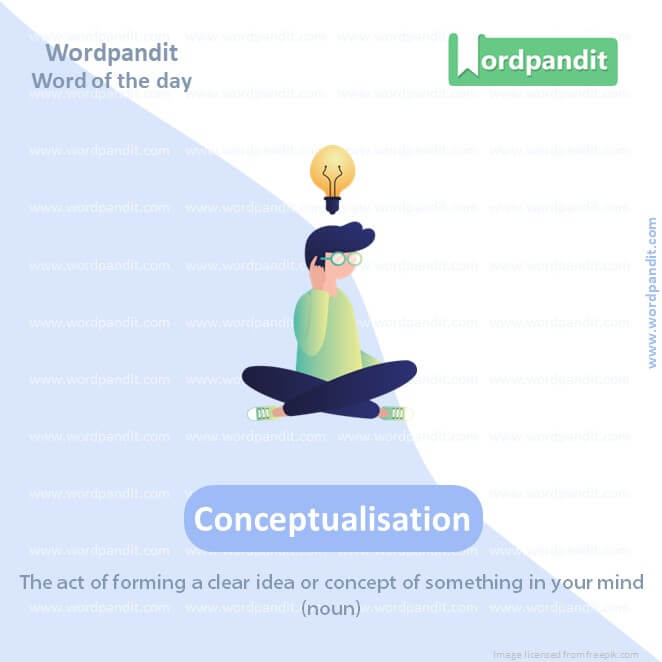
WORD-3: Conceptualisation
CONTEXT: Three sequential steps are foundational in the conceptualisation of a grand strategy.
SOURCE: The Hindu
EXPLANATORY PARAGRAPH: Think about when you imagine a new game or a fairy tale in your head before you draw it or tell someone about it. “Conceptualisation” is like that. It’s creating an idea or a plan in your mind.
MEANING: The act of forming a clear idea or concept of something in your mind
(noun).
PRONUNCIATION: con-sep-chew-uh-LIE-zay-shun
SYNONYMS: formulation, invention, ideation, creation, design
USAGE EXAMPLES:
1. The conceptualisation of the new product took months.
2. Early conceptualisation is crucial in project development.
3. The artist’s conceptualisation was unique and imaginative.
4. Conceptualisation of the event began early in the year.
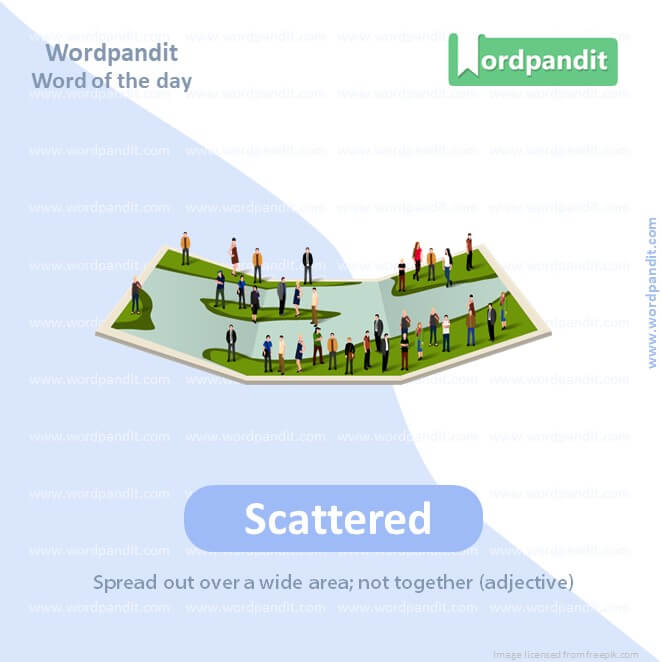
WORD-4: Scattered
CONTEXT: The Chennai Climate Action Plan (CCAP) offers several meaningful suggestions including those discussed here, albeit scattered under different sections.
SOURCE: Hindustan Times
EXPLANATORY PARAGRAPH: Think of when you throw your toys all over the room, and they end up everywhere. “Scattered” means things are spread out all over the place, not in one spot.
MEANING: Spread out over a wide area; not together (adjective).
PRONUNCIATION: SKA-turd
SYNONYMS: dispersed, spread, strewn, sprinkled, distributed
USAGE EXAMPLES:
1. Leaves were scattered by the wind across the lawn.
2. The toys were scattered all over the playroom floor.
3. People were scattered throughout the park enjoying the sunny day.
4. Information on the topic was scattered across different sources.
WORD-5: Amelioration
CONTEXT: On all the big issues – the funding of public infrastructure, the NHS, the amelioration of the cost of living crisis, a benefits overhaul – the world isn’t set to look much different once the Tories are gone.
SOURCE: Guardian
EXPLANATORY PARAGRAPH: Imagine you have a small scratch on your toy, and you paint over it to make it look better. “Amelioration” is like that. It means making something better or improving it.
MEANING: The act of making something better or improving it (noun).
PRONUNCIATION: uh-mel-yuh-RAY-shun
SYNONYMS: improvement, enhancement, betterment, refinement, upgrading
USAGE EXAMPLES:
1. The amelioration of living conditions is the focus of the new policy.
2. He contributed to the amelioration of the software.
3. Efforts for the amelioration of the relationship were successful.
4. The new laws led to the amelioration of safety standards.
WORD-6: Perspiration
CONTEXT: Humidity reduces the cooling effect of perspiration, leading to a person experiencing an elevated body temperature, debilitating heat stress, exhaustion, and even a potentially fatal heat stroke.
SOURCE: Hindustan Times
EXPLANATORY PARAGRAPH: Think of how you feel all wet and sticky after running around and playing outside on a hot day. That wetness is called “perspiration.” It’s your body’s way of cooling you down.
MEANING: The process of sweating (noun).
PRONUNCIATION: pur-spuh-RAY-shun
SYNONYMS: sweat, sweating, moisture, exudation, sudation
USAGE EXAMPLES:
1. After the long run, his shirt was soaked with perspiration.
2. Perspiration is a natural response to physical exertion.
3. The gym was filled with the sound of equipment and the sight of perspiration.
4. She wiped the perspiration from her forehead after the intense workout.
WORD-7: Fomenting
CONTEXT: The Tories is potentially dangerous, both in terms of creating a growing vocal group of people upset with Labour, and in fomenting a negative, unstable political climate – one in which the party leadership and its supporters seek not to understand why some voters feel a certain way, but to condemn and dismiss them.
SOURCE: Guardian
EXPLANATORY PARAGRAPH: Imagine you see your friends are a little upset about not having extra playtime, and you start talking to them about why they should ask the teacher for more time. This is like “fomenting.” It means to stir up or encourage something, usually not in a calm way.
MEANING: Instigating or stirring up undesirable feelings or actions (verb).
PRONUNCIATION: foh-MENT-ing
SYNONYMS: inciting, provoking, agitating, stirring up, instigating
USAGE EXAMPLES:
1. The leader was accused of fomenting violence.
2. Fomenting discord within the group can lead to its downfall.
3. The article was criticized for fomenting public fear.
4. He was known for fomenting rebellion during the protests.
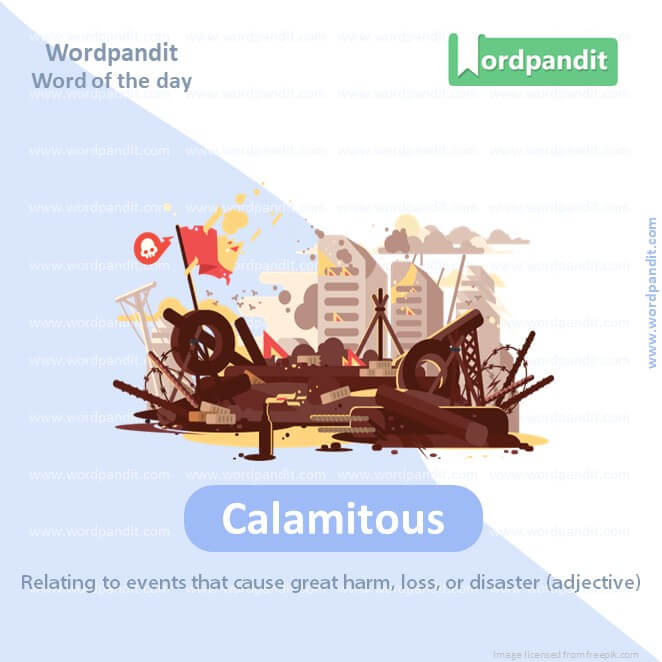
WORD-8: Calamitous
CONTEXT: It’s a hostage situation where the stakes seem high on a political level – a Labour government, finally, after a calamitous rightwing reign – but are in fact low on a personal one.
SOURCE: Guardian
EXPLANATORY PARAGRAPH: Think of a big storm that breaks trees and makes a huge mess. “Calamitous” is a word used to describe something really bad that causes a lot of trouble or damage, like that big storm.
MEANING: Relating to events that cause great harm, loss, or disaster (adjective).
PRONUNCIATION: kuh-LAM-ih-tuss
SYNONYMS: disastrous, catastrophic, devastating, ruinous, tragic
USAGE EXAMPLES:
1. The calamitous earthquake left many buildings in ruins.
2. The decision led to calamitous results for the company.
3. His actions had calamitous effects on his career.
4. They feared a calamitous outcome if nothing was changed.
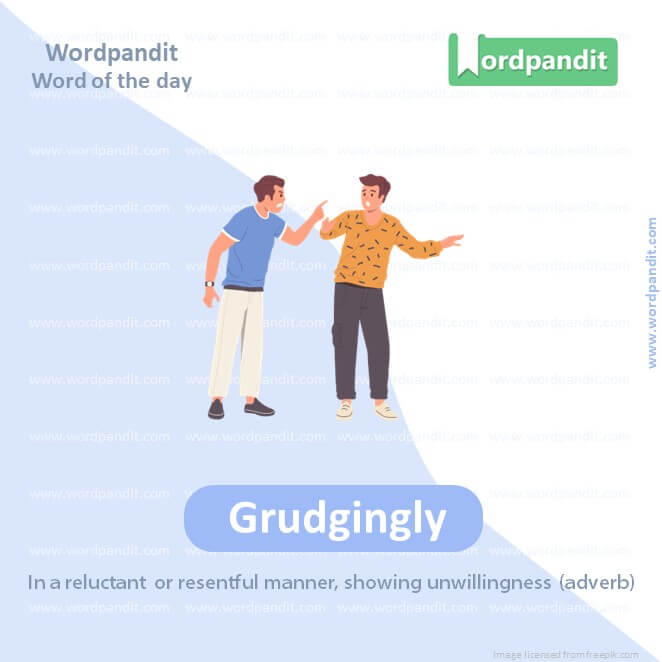
WORD-9: Grudgingly
CONTEXT: The general election, that has just concluded, is a veritable testimony to India’s, at times enthusiastic, at others grudging, acceptance of hues of Hindu nationalism.
SOURCE: The Hindu
EXPLANATORY PARAGRAPH: Imagine you have to share your favorite toy with your brother or sister, but you really don’t want to. When you finally let them play with it, but you’re not happy about it, that’s called being “grudging.” It means you’re doing something but you don’t really want to.
MEANING: In a reluctant or resentful manner, showing unwillingness (adverb).
PRONUNCIATION: GRUHJ-ingly
SYNONYMS: reluctant, unwilling, resentful, reluctant, begrudging
USAGE EXAMPLES:
1. He gave a grudging apology after the argument.
2. Her help was grudging, and she made her displeasure known.
3. The agreement was accepted with a grudging nod.
4. His grudging cooperation was evident to everyone.
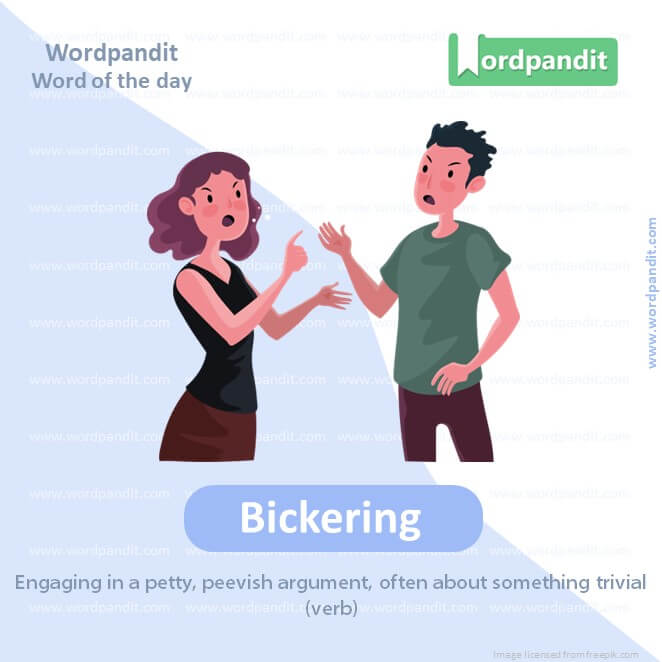
WORD-10: Bickering
CONTEXT: Disregarding them only sours things at a moment when Labour claims to be embarking on a grand confidence-building, positive and stabilising exercise that cleanses politics of the Tory factionalism, bickering and infighting that has marked the past few years.
SOURCE: Guardian
EXPLANATORY PARAGRAPH: Imagine you and your friend can’t decide who gets to play with a toy first, and you keep arguing back and forth. This kind of small, ongoing argument is called “bickering.” It’s when people argue about little things that aren’t very important.
MEANING: Engaging in a petty, peevish argument, often about something trivial
(verb).
PRONUNCIATION: BIK-er-ing
SYNONYMS: quarreling, arguing, squabbling, disputing, wrangling
USAGE EXAMPLES:
1. The children were bickering over who would get the last piece of cake.
2. They spent the whole afternoon bickering about trivial matters.
3. Bickering in the workplace can reduce teamwork and productivity.
4. Their constant bickering was a source of amusement for their friends.
Vocabulary new Words
In the exuberant realm of language learning, nothing holds more thrill than the discovery of ‘vocabulary new words’. These gems of knowledge bring with them a fresh perspective and a deeper understanding of language. However, learning ‘vocabulary new words’ requires a methodical and focused approach.
The act of learning ‘vocabulary new words’ is a delve into linguistic novelty, often involving exposure to unfamiliar structures and meanings. Transcending the traditional approach of mere memorization helps in truly cementing newly learnt words into long-term memory. Interaction with a broad spectrum of written and spoken material, including novels, films, podcasts, and digital resources, provides a rich context of ‘vocabulary new words’ and significantly aids in their comprehension.
It’s noteworthy that unpacking ‘vocabulary new words’ is a steady process rather than a rushed one. A planned approach with a specific number of words, learned and reviewed each day, proves beneficial in effective learning. Coupling this method with technologies such as flashcards or memory-enhancement software can optimize the retention of ‘vocabulary new words’.
Integrating mnemonic devices and visual imagery is another highly efficient tool when learning ‘vocabulary new words’. Assigning unique stories or visuals to new words can enhance recall, making unfamiliar vocabulary much more approachable.
Lastly, practicing ‘vocabulary new words’ within daily routine is crucial for grasping their usage. Whether it’s through active utilization in conversation or incorporating these words in written communicative situations, application reinforces understanding.
In summation, mastering ‘vocabulary new words’ is an enriching pursuit that expands our linguistic horizons. However, a balanced approach, combining diverse reading materials, pacing your learning, employing memory-boosting strategies, and daily practice greatly streamlines the task. Embark on this fascinating journey, and let the ‘vocabulary new words’ fill your linguistic canvas with a fresh palette of expressions.













